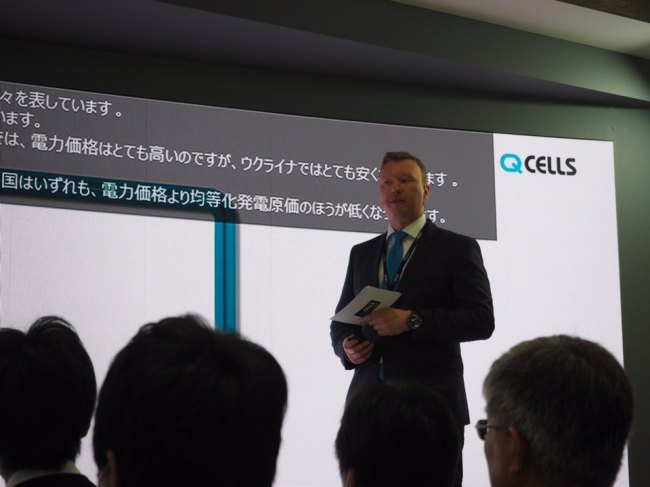TOKYO -- The cost of generating solar energy can be reduced further even without state subsidies via technological advances that increase the power-generating capacity of each cell module, a marketing expert with a global photovoltaic system giant said last week.
The levelized cost of a solar energy system -- that is, the net cost of installing it divided by the amount of energy it can be expected to produce over its lifetime -- has fallen rapidly in recent years. According to data compiled by the Bank of Korea, in the first quarter of 2018 the figure for the US had plunged 68 percent from the same quarter four years earlier.
The lower cost of generating solar energy today, even considering the initial costs of purchasing and installing the necessary equipment, will create more market demand, said Martin Ezhold, head of product marketing at Hanwha Q Cells’ office in Germany. This is a chance for the company to shift from its position as a leading module maker to that of a total energy solution provider.
 |
Martin Ezhold, head of product marketing at Hanwha Q Cells’ office in Germany, speaks at the Smart Grid Expo in Tokyo on Thursday. (Hanwha Q Cells) |
“It will become the cheapest source of electricity, and we are in a very good position to expand our business,” Ezhold said in an interview with The Korea Herald.
“We are looking for a change in business now with our Q.home business. Not only with PV, energy storage system, (but also) we provide and technologies for houses that control all your energy demand and production at the same time,” he said.
Ezhold’s confidence stems from what the company refers to as Q.antum technology, which increases the efficiency of solar power systems and controls degradation. The company is expanding solar panel sales for both residential and commercial use in Europe, US and Japan, with the Q.Peak Duo, a kind of Q.antum technology that uses half-size cells to increase energy efficiency by better facilitating electron transfer in solar cells.
“We have developed our Q.antum technology in a very early stage and discovered the solution for the degradation effect, while many manufacturers are still struggling with finding solution for degradation effects,” he said, suggesting the company has an advantage that will enable it to take the lead as a total energy solution provider.
Hanwha Q Cells was an exhibitor at the Smart Grid Expo in Tokyo last week, part of an effort to expand its business strategy as a provider of integrated solar power and consumption systems. The company is already the top PV module provider for the residential solar energy market in Japan.
Betting on new business opportunities, Hanwha Q Cells has introduced a wide range of PV generation systems. These include energy storage systems and surveillance camera and mobile application systems for energy management, according to Ezhold, who said the use of PV energy at home will become the next big thing worldwide.
“It will be pretty typical to have your own PV system and your own ESS at home, and use your energy and share them with others,” he said. “This will become pretty typical for our daily lives and this is what is happening (now) in Germany.”
By Cho Chung-un, Korea Herald correspondent
(
christory@heraldcorp.com)








